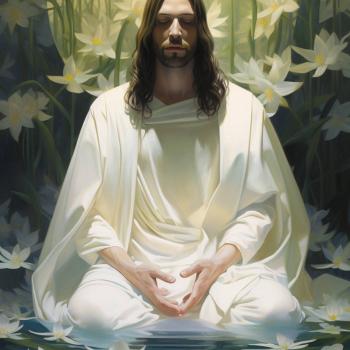Athanasius was promoted to bishop of Alexandria around 328. The Arian controversy raged on with each side fighting to win the favor of the Roman emperor Constantine the Great. The Arian Party was influential enough to succeed in getting Athanasius kicked out of the country five times. Yet this did not deter him. Possessing a forceful and even brash personality, Athanasius railed against his adversaries extending little charity and even less wiggle room to their heretical leanings. His conviction and dogged persistence eventually led to the formulation of the Nicene Creed and a final triumph over the Arians. Athanasius labored in relative quiet for the last few years of life and died on May 2, 373.
In one of his earliest works, On the Incarnation, Athanasius delineated a second foundational theological affirmation: Christ "was made man that we might be made like God." Why? Only a man who was God could restore separated and sinful humanity to full union with God. Why was such restoration desirable? Why would God not just pitch the recalcitrant and ungrateful sorts aside? Because a God who is good begrudges no one life. It is as St. Peter wrote, "God wants no one to perish but everyone to come to repentance" (2 Pet. 3:9). The goodness of God led to His creation of all things in the first place. "Begrudging existence to no one," Athanasius wrote, God "has made all things out of nothing by His own Word, Jesus Christ our Lord."
However, being made out of nothing, creation's substance was in essence unstable -- weak and in flux. As creation rather than the Creator, it unavoidably devolved toward the nothing from whence it was formed -- a condition physicists describe as entropy. Yet because the goodness of God who begrudges no one life extends beyond mere creation to the sustaining of that creation, He intervened in order to prevent its decline. This was especially the case as it concerned humanity. Of all He had created, Athanasius wrote, God had special pity "upon the human race. Seeing that by virtue of the condition of its origin it would be unable to persist forever, God gave it an added grace, a further gift. Rather than simply creating people as He did all the irrational creatures on the earth, He made them after His own image, giving them a portion even of the power of His own Word. Having as it were a kind of reflection of the Word, and being made rational, people were made with the ability to abide forever in blessedness, living the true life which belongs to the saints in paradise."
Athanasius scholar Alvyn Pettersen notes, "Like the rest of creation being made from nothing, creaturely humanity was prevented from lapsing back into nothingness in and through the gracious providence of a good God." However, this gracious providence did not operate to negate human volition. Athanasius argues that God knew "how the human will could sway to either side." Therefore in anticipation of their fickleness, God placed people "into His own garden, and gave them a law: so that, if they kept the [added] grace and remained good, they would enjoy the life in paradise without sorrow or pain or care besides having the promise of immortality in heaven. But if they transgressed and turned back, and became evil, they would no longer live in paradise, but be cast out of it from that time forth to die and to abide in death and in corruption."
This life of paradise went beyond carefree immortality -- it included intimate community with others as well as with God. In the latter case, unfortunately, such a relationship proved problematic. It was kind of hard for created people to have much of an intimate relationship with One who is by nature invisible, incomprehensible, and uncreated. Therefore "God," Athanasius wrote, "Who has the power over all things, when He was making the human race through His own Word, seeing the weakness of their nature, that it was not capable in itself to know its Maker, nor to get any idea at all of God. . . .Taking pity, on the human race, inasmuch as He is good, God did not leave them destitute of the knowledge of Himself, lest they should find no profit in existing at all. . . . Nay, why did God make them at all, if He did not wish to be known by them?"
Athanasius asserted that God's good will is for people to delight in knowing Him and to that end He reveals Himself constantly and in many different ways. At the same time, in line with true godliness, the relationship could not be coerced but only offered to humanity's free choice. This was the risk. People may not want it. God, unwilling to deny human freedom, nevertheless accounted for its volatility by providing garden boundaries within which the free relationship might develop. Yet humanity transgressed the boundaries and opted for death and corruption. Under normal circumstances, such rejection of God should have rendered humanity hopelessly reprobate. Sinning against an infinite God is infinitely bad.





